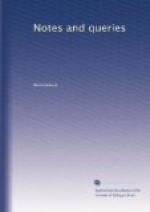Henry VIII.
Act I. Scene 1. Shakspeare.
"
2. Ditto.
"
3. Fletcher.
"
4. Ditto.
Act II. " 1. Ditto.
"
2. Ditto.
"
3. Shakspeare.
"
4. Ditto.
Act III. " 1. Fletcher.
"
2. Shakspeare, (ending with ’what
appetite
you have.’)
"
2. Fletcher, (beginning from the
above.)
Act IV. " 1. Ditto.
"
2. Ditto.
Act V. Scene 1. Shakspeare
"
2. Fletcher.
"
3. Ditto.
"
4. Ditto.
Prologue and Epilogue, Ditto.
So far all is clear, and in this apportionment Mr. Urban’s correspondent and myself are agreed. My conviction here is as complete as it is of my own identity. But beyond, at present, all is dark; I cannot understand the arrangement; and I doubt if my friend, who has treated the question with so much ability, is altogether satisfied with his own explanation.
In the meanwhile, I would suggest one or two points for consideration. In those parts which I have set down as Shakspeare’s, and in which this writer imagines he occasionally detects “a third hand,” does the metre differ materially from that of Shakspeare’s early plays?
It will be observed that, in Act iii., Scene 2., there are two farewells, the second being a kind of amplification of the first; both, however, being in the part which I ascribe to Fletcher. Is it not probable that these were written at different periods? And supposing Fletcher to have improved his part, might there not originally have been a stronger analogy than now appears between this play and the Two Noble Kinsmen?
The more it is tested the brighter shines out the character of Shakspeare. The flatteries of James and Elizabeth may now go packing together. The following four lines which I have met with in no other edition of Shakspeare than Mr. Collier’s, are worth any one of his plays for their personal value; they show how he could evade a compliment with the enunciation of a general truth that yet could be taken as a compliment by the person for whom it was intended:
Shakspeare on the King.
“Crowns have their compass; length
of days their date;
Triumphs, their tomb; felicity her fate;
Of nought but earth can earth make us
partaker,
But knowledge makes a king most like his
Maker.”
Samuel Hickson.
August 12. 1850.
* * * * *
MINOR QUERIES.
The Abbe Strickland.—In the third volume of the Castlereagh Correspondence, an Abbe Strickland figures as a negotiator between the English Catholics and the court of Rome. His name is also mentioned unfavourably in the “Quarterly” review of that work. Will some of your readers direct me where further information can be had of him, and his ultimate destination?




